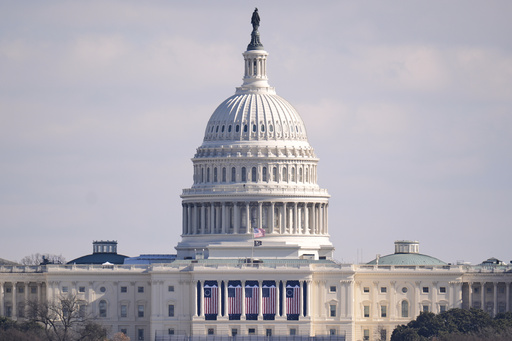WASHINGTON — Donald Trump took his oath of office again on Monday in the crowded Capitol Rotunda, a stark contrast to the Washington landscape of eight years ago.
When he last spoke during his inauguration, Trump painted a grim picture, describing “American carnage” as rain fell on the ceremony. At that time, many Republicans in Congress were hesitant about his most extreme proposals and were prepared to investigate his past.
In contrast, today’s Republicans are largely united in their support of the president. World leaders and prominent business executives—who were once skeptical of Trump—came to the ceremony, willing to endure frigid temperatures to publicly endorse him before festivities shifted indoors.
Four years earlier, Washington was in disarray after a violent mob of Trump supporters stormed the Capitol. Their actions disrupted the certification of Joe Biden’s election win, with the rioters using parts of the Capitol’s scaffolding against law enforcement.
The Rotunda itself was overwhelmed by chaos then, as rioters clambered through, calling out to lawmakers and clashing with police who were trying to regain control. They even infiltrated Statuary Hall, the same location where Trump had a celebratory luncheon following this inauguration.
Trump chose not to attend Biden’s inauguration, leading many to believe his political career had ended after 2021. However, he returned rejuvenated, bringing renewed energy back to Washington.
“It’s a party victory in the sense that there’s this new populist Republican Party,” commented Sen. Kevin Cramer, R-N.D. “Enthusiasm levels today are undeniably higher than they were eight years ago.”
In this environment of heightened enthusiasm for Trump, even some Democrats seem willing to collaborate with him. Numerous Democrats attended the traditionally bipartisan luncheon, where lawmakers from both parties, Supreme Court justices, and major tech executives gathered to support the new president.
Democratic Senators Kirsten Gillibrand from New York and Chris Coons from Delaware spoke with Trump, while Coons shook his hand. Sen. Amy Klobuchar, D-Minn., who organized the inauguration, shared laughter with both Trump and Vice President JD Vance throughout the luncheon.
Trump’s second swearing-in ceremony was notably held indoors due to inclement weather. The grand platform on the Capitol’s West Front remained empty, cloaked in tarps and cables, as the event progressed inside.
Biden’s 2020 inauguration was also atypical, featuring sparse crowds due to the COVID-19 pandemic, with guests spaced out rather than clustered together.
Cramer reflected on attending Biden’s swearing-in but noted that many lawmakers were absent, describing it as “weird” yet more intimate. “I remember the large teleprompter and just how few people were there,” he stated.
When asked if he ever thought Trump would again take the oath of office in the Capitol after being largely sidelined following the January 6 insurrection, Cramer acknowledged, “It was always a possibility.”
Sen. Mike Rounds, R-S.D., observed that while Trump was an enigma in 2017, Republicans are now more familiar with his style. “They recognize he will make bold statements and test boundaries, but they also understand he will listen to counsel and then decide,” Rounds noted.
Despite the solid support among Republicans in Washington, Trump’s nascent presidency faces hurdles, such as a slim majority in the House and diverse opinions within the party as they aspire to pass extensive bills on tax cuts, immigration, and energy policies.
An early challenge arose in December when Congress dismissed Trump’s attempt to attach a debt limit increase to year-end spending discussions.
In his concluding hours as president, Biden granted several preemptive pardons, including those connected to members and staff of the January 6 committee, along with police officers who provided testimony regarding the riot.
For Democrats, the current political climate is tense. “The challenges we face and the divisiveness in our country are profound,” stated Democrat Andy Kim of New Jersey, a freshman senator. “This is not merely about who occupies the Oval Office; it encompasses much more than just Trump or Biden.”
Kim expressed intentions to propose legislation that could foster bipartisan cooperation, focusing on initiatives like civic education investments or national service programs in anticipation of America’s 250th anniversary.
Sen. Angus King, an independent from Maine, indicated a notable difference in Trump’s Cabinet nominees, many of whom seem chosen for their loyalty rather than qualifications—unlike eight years ago when several were well-regarded and experienced.
Remembering Trump’s first inauguration, King recalled the impactful moment when Trump spoke of “American carnage.” “That declaration was striking,” he recalled.
This time, Trump echoed similar sentiments regarding the nation’s status. “The corrupt establishment has drained power and wealth from our citizens while our society’s foundations lay shattered,” he remarked. “From this moment forward, America’s decline is at an end.”




